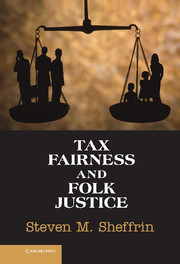Book contents
- Frontmatter
- Dedication
- Contents
- Preface
- Glossary of Terms in Psychology, Philosophy, and Economics
- 1 Approaching Tax Fairness
- 2 The Foundations of Folk Justice
- 3 Fairness and the Property Tax
- 4 Should We Redistribute Income through Taxation?
- 5 Why Do People Pay Taxes?
- 6 Desert, Equity Theory, and Taxation
- 7 Concluding Perspectives
- Bibliography
- Index
2 - The Foundations of Folk Justice
Published online by Cambridge University Press: 05 July 2013
- Frontmatter
- Dedication
- Contents
- Preface
- Glossary of Terms in Psychology, Philosophy, and Economics
- 1 Approaching Tax Fairness
- 2 The Foundations of Folk Justice
- 3 Fairness and the Property Tax
- 4 Should We Redistribute Income through Taxation?
- 5 Why Do People Pay Taxes?
- 6 Desert, Equity Theory, and Taxation
- 7 Concluding Perspectives
- Bibliography
- Index
Summary
In Chapter 1, we advanced three arguments for making considerations of folk justice central to our deliberations of social policy. First, unless social theories and practices “resonate” with individual psychology, they are often likely to miss their mark in behavioral comprehension. The gap between theory and practice in property taxation makes a compelling case for this principle. The second argument was based on “institutions.” Existing norms and practices in society will develop and evolve based on individual psychological foundations. The ability to grasp the logic of these institutions – for example, property tax limitations – will require a firm understanding of their psychological foundations. Finally, and a bit more speculatively, ideas of folk justice and individual psychology may provide insights into “expert” knowledge. Social evolution has equipped individuals and societies with special talents for succeeding in social situations; for example, reading emotions or detecting dishonesty in social contexts. Studying the foundations of individual folk psychology may provide insights into these realms of knowledge, enabling us to understand the evolution of social institutions and areas in which to rely on social expertise.
This investigative project relies on a clear and coherent portrait of folk justice from which insights can be drawn. In the first part of this chapter, we describe and develop in detail five key elements of the psychology of folk justice: procedural justice, equity and social exchange theory, qualified perceptions of fairness, moral mandates, and system justification theory. We analyze the foundations for each of these theories with the aim of learning how they can be applied in concrete social policy settings.
- Type
- Chapter
- Information
- Tax Fairness and Folk Justice , pp. 28 - 68Publisher: Cambridge University PressPrint publication year: 2013

